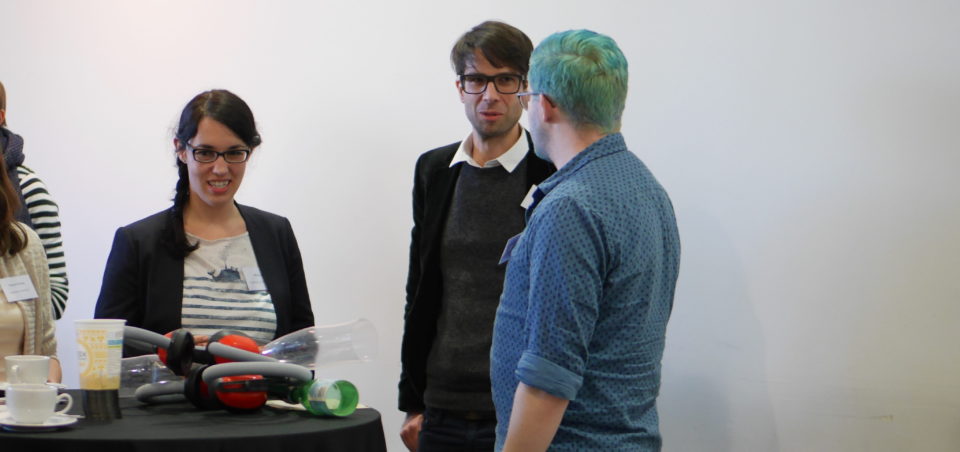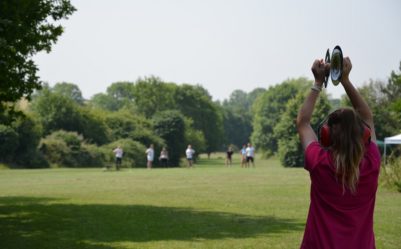
By Anna Woolman, UKSFN coordinator
On 9 November and for the first time, current and aspiring science festival organisers came together at the National Museum of Scotland in Edinburgh to discuss the sector and its future. The UK Science Festivals Network (UKSFN) Conference provided a space for people from across the country to share best practice, address challenges, and celebrate everyone’s work.
If you didn’t make it to the conference and would like a snapshot of the day, or were lucky enough to attend and want to relive it, we’ve put together a selection highlights for you. Read below for the best stats, top tips, insightful words from experts and the fascinating discussions that took place.
If you have any questions or would like to find out more about the conference or Network, please contact the UKSFN team.
Science Festivals in the UK
We’re collectively reaching millions!
Ivvet Modinou (UK Science Festivals Network)
The day started with an introduction from Ivvet Modinou, Chair of the UKSFN. She gave an overview of the Network, which currently has 45 members from across the UK, including both science festivals and non-science festivals, as anyone is allowed to join as long as they incorporate science into their programmes.
Data collected from members found that festivals had over 1.7 million face-to-face audience interactions in 2016. Encouragingly, that shows a huge number of people are actively engaging with science over the course of a year.
Ivvet also detailed the UKSFN’s work with the Audience Agency. Together, we are trying to understand which audiences are attending science festivals, and more importantly, identifying segments of the population that are aren’t. By gaining these insights, we can develop new programmes and approaches that will appeal to everybody. It’s crucial we give everyone the opportunity to engage.
You can find the presentation slides here.
Reaching new audiences
Relevance and trust are key
Chair – Christina Fuentes-Tibbitt (British Science Association), Jo Enderby (RCUK/EPSRC), Debbie McNeill (Glasgow Science Festival) and Moira McCaig (Concrete Garden)
This panel discussed the recent successes and learnings from collaborative projects that bring science to local communities. A key message was that festival partnerships with community groups are integral to ensuring those people are actually reached. Moira talked about how her community in Possilpark, South Glasgow, is interested in engaging with science, but it has to be made relevant to them and delivered by trusted providers.
Read more about Concrete Garden.
Getting with the programme
Have fun, and don’t leave anyone behind
Chair – Anna Woolman (UK Science Festivals Network), Antonio Benitez (Manchester Science Festival), Hana Ayoob (Minorities in STEM/Cheltenham Science Festival) and Guy Armitage (Zealous)
Here we explored the role partnerships, creativity and diversity have in ensuring the most is made of a festival programme. This covered a wide breadth of topics, from the diversity ‘on the stage’ to the festival experience as a whole, ensuring creativity and playfulness is at the heart of everything. Hana importantly highlighted the necessity in considering invisible diversity (e.g. disabilities, sexuality) when programming speakers, and that certain, often underrepresented audiences, will attend events if it’s programmed ‘for them’. For example, Pride in STEM have been hugely successful in engaging LGBT+ communities with scientific topics in this way.
Growing pains
Make friends, ask for help and self-reflect
Chair – Dane Comerford (Oxfordshire Science Festival), Megan Shore (Nottingham Festival of Science and Curiosity), Chris McCreery (Northern Ireland Science Festival) and Laura Fogg-Rogers (University of the West of England)
How can festivals grow and create ‘permanency’ in their communities?
In just three years, NI Science Festival went from inception to a fully established and welcomed festival for the local community. Chris, the Festivals’ director, emphasised how important the US Science Festival Alliance’s resources were in the initial planning stages, especially when writing funding bids, and encouraged newcomers to utilise them.
Megan discussed Nottingham Festival of Science and Curiosity’s work with the infrastructure business, Balfour Beatty. An initial concern was that working with a bigger, more business-focussed partner could cause them to lose their community-led feel. However, Nottingham came to realise that it was essential for them to grow as a festival, as it enabled a more target-led approach.
An important aspect of growing any event is evaluation. This allows you to understand your audiences and their opinions. Laura’s research on science festival evaluation methodology found that snapshot interviews are effective at obtaining meaningful feedback, but can be quite resource heavy in terms of getting interviewers, and often the sample sizes are small. A simple feedback form, on the other hand, takes up fewer resources and gives you a large sample size, but you may not get the nuances that you would from a snapshot interview. Choosing the method that suits your festival is key, and will be different for everyone.
Unsurprisingly, science festivals continue to attract the already scientifically engaged, but Laura made the point that this is OK! Organisers shouldn’t feel bad that they’re attracting people who already like science – at the end of the day, arts festivals attract those who like arts. However, it’s still imperative that we’re aware of this and continue to take steps to broaden the audiences who attend, such as working with community partners.
Science events showcase
Meet and greet!
The showcase provided an excellent opportunity for science festivals to showcase their work, as well as for delegates to network.
Scanning the horizon
We’re not alone
Chair – Ivvet Modinou, Ben Wiehe (US Science Festival Alliance) and Amanda Tyndall (Edinburgh International Science Festival)
To close the day we were joined by Ben, who came all the way from America to share stories from their science festival scene. What struck him was how paralleled the successes and struggles are between the UK and US, particularly regarding the difficulties we each have in reaching audiences that aren’t typically engaged with science.
We can learn a lot from each other, but maybe most importantly, for both sides, it is good to know we’re not alone in this crazy little bubble.
All in all, it was an informative and entertaining day, filled with opportunities to meet like-minded people striving for the same goals. We’d like to thank everyone who came along to the conference or has engaged with the UK Science Festivals Network in any way.
Find out more about what was discussed at the conference by following #UKSFN17 on Twitter.

